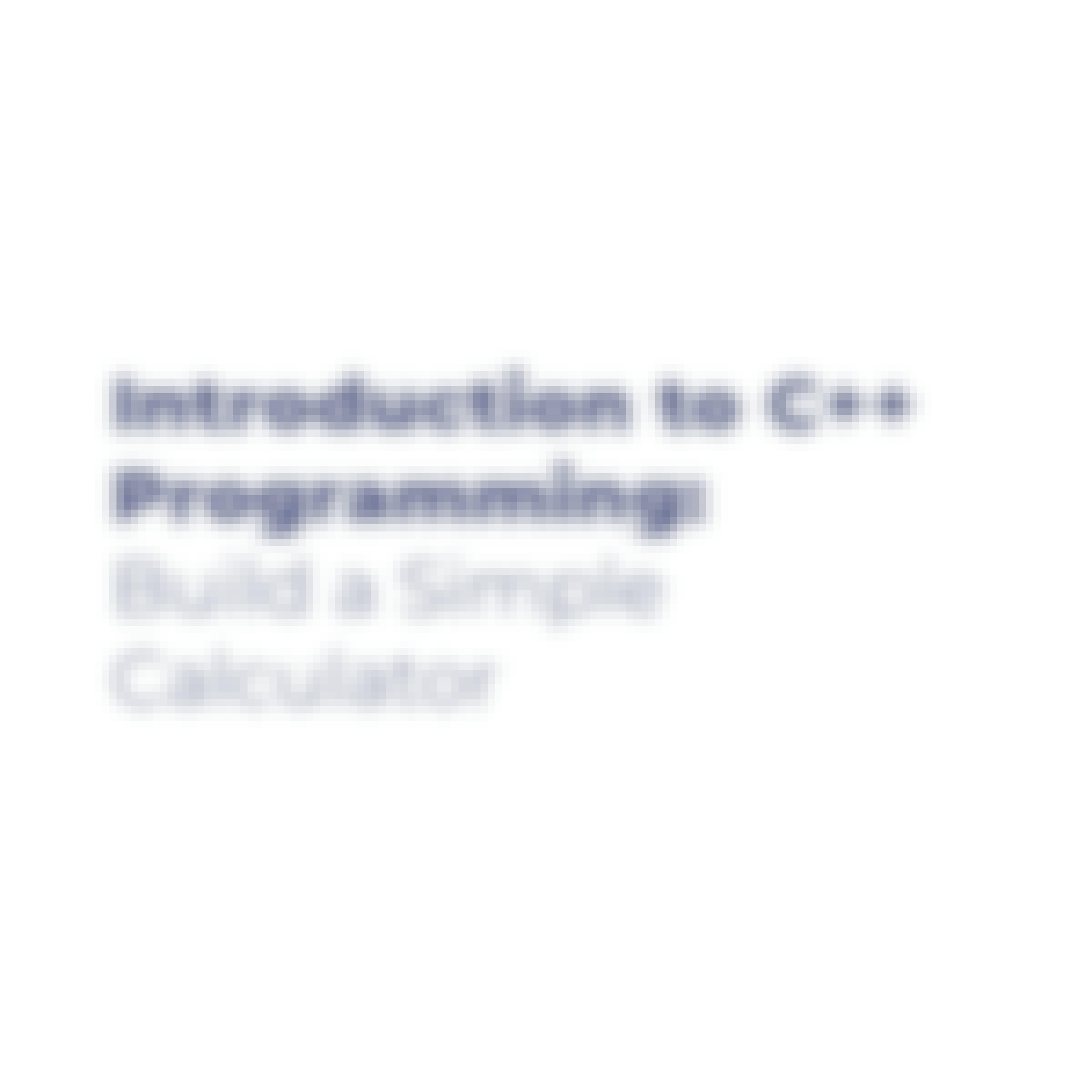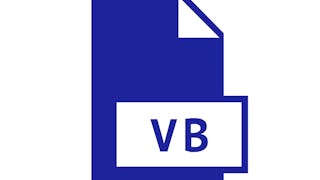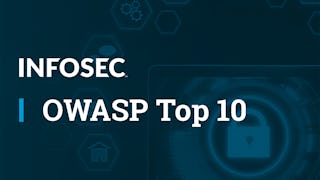- Browse
- Coding
Coding Courses
Coding courses can help you learn programming languages like Python, Java, and JavaScript, as well as concepts such as algorithms, data structures, and web development. You can build skills in debugging, version control, and software testing, which are crucial for creating efficient code. Many courses introduce tools like Git for version control, integrated development environments (IDEs) like Visual Studio Code, and frameworks such as React or Django, showing how these skills are applied in real projects.
Popular Coding Courses and Certifications

Skills you'll gain: Program Development, C and C++, C++ (Programming Language), Object Oriented Programming (OOP), Computer Programming, Development Environment, Software Development, Computer Science
4.4·Rating, 4.4 out of 5 stars60 reviewsBeginner · Guided Project · Less Than 2 Hours
 Status: Free TrialFree Trial
Status: Free TrialFree TrialSkills you'll gain: Software Documentation, Generative AI, API Testing, Test Automation, Mockups, Software Development Tools, User Interface and User Experience (UI/UX) Design, Usability, Software Testing, AI Security, AI Workflows, Application Security, Maintainability, Prompt Engineering, Test Case, Software Architecture, Code Review, Secure Coding, Artificial Intelligence, Debugging
3.8·Rating, 3.8 out of 5 stars15 reviewsBeginner · Specialization · 1 - 3 Months
 Status: Free TrialFree TrialL
Status: Free TrialFree TrialLLearnQuest
Skills you'll gain: Visual Basic (Programming Language), Development Environment, Microsoft Development Tools, Programming Principles, .NET Framework, Computer Programming, Integrated Development Environments, Application Development, Software Development, Cross Platform Development, Debugging
4.7·Rating, 4.7 out of 5 stars51 reviewsBeginner · Course · 1 - 4 Weeks
 Status: Free TrialFree Trial
Status: Free TrialFree TrialSkills you'll gain: Open Web Application Security Project (OWASP), Vulnerability Assessments, Application Security, Vulnerability Management, Secure Coding, Hardening, Security Controls, Cybersecurity, Authorization (Computing), Cryptography, System Configuration, Encryption
4.5·Rating, 4.5 out of 5 stars74 reviewsIntermediate · Course · 1 - 3 Months
 Status: Free TrialFree TrialU
Status: Free TrialFree TrialUUniversity of Glasgow
Skills you'll gain: Deep Learning, Model Evaluation, Data Ethics, Health Informatics, ICD Coding (ICD-9/ICD-10), Clinical Data Management, Medical Records, Clinical Informatics, Descriptive Analytics, Database Design, AI Security, Electronic Medical Record, Responsible AI, Data Mining, Precision Medicine, Analytics, Recurrent Neural Networks (RNNs), Data Preprocessing, Machine Learning, Autoencoders
4.4·Rating, 4.4 out of 5 stars35 reviewsIntermediate · Specialization · 3 - 6 Months
 Status: Free TrialFree TrialA
Status: Free TrialFree TrialAArizona State University
Skills you'll gain: Object Oriented Programming (OOP), Object Oriented Design, Event-Driven Programming, Python Programming, User Interface (UI), Computer Programming, Human Computer Interaction, Application Development, Graphical Tools
3.7·Rating, 3.7 out of 5 stars16 reviewsBeginner · Course · 1 - 4 Weeks
 Status: Free TrialFree Trial
Status: Free TrialFree TrialSkills you'll gain: Real-Time Operating Systems, Embedded Systems, Internet Of Things, System Requirements, Software Development, Secure Coding, Cloud Computing Architecture, System Design and Implementation, Communication Systems, System Testing, Algorithms, Performance Testing, Computer Vision, Innovation, Encryption
4.6·Rating, 4.6 out of 5 stars69 reviewsAdvanced · Course · 1 - 4 Weeks
 Status: PreviewPreviewB
Status: PreviewPreviewBBoard Infinity
Skills you'll gain: DevSecOps, DevOps, Application Security, Secure Coding, Security Testing, Continuous Delivery, CI/CD, Security Engineering, Continuous Integration, Threat Modeling, Containerization, Continuous Monitoring, Vulnerability Management, Cloud Security, Automation
4.4·Rating, 4.4 out of 5 stars22 reviewsBeginner · Course · 1 - 4 Weeks
 Status: Free TrialFree TrialI
Status: Free TrialFree TrialIInfosec
Skills you'll gain: Secure Coding, Computer Programming Tools, C and C++, C++ (Programming Language), Software Development Tools, C (Programming Language), Debugging
2.7·Rating, 2.7 out of 5 stars23 reviewsMixed · Course · 1 - 4 Weeks
 Status: Free TrialFree TrialM
Status: Free TrialFree TrialMMicrosoft
Skills you'll gain: Role-Based Access Control (RBAC), Authentications, Secure Coding, ASP.NET, Microsoft Copilot, Data Security, Back-End Web Development, Authorization (Computing), JSON, Identity and Access Management, Data Storage, Application Programming Interface (API), Encryption
4.7·Rating, 4.7 out of 5 stars10 reviewsBeginner · Course · 1 - 4 Weeks
 Status: Free TrialFree TrialB
Status: Free TrialFree TrialBBoard Infinity
Skills you'll gain: CI/CD, Jenkins, Docker (Software), Spring Boot, Continuous Integration, Configuration Management, Containerization, Scalability, Software Documentation, Application Deployment, Cloud Deployment, Java, Continuous Deployment, API Gateway, Back-End Web Development, JUnit, Application Programming Interface (API), Secure Coding, Java Programming, React.js
3.8·Rating, 3.8 out of 5 stars10 reviewsIntermediate · Specialization · 1 - 3 Months
 Status: Free TrialFree Trial
Status: Free TrialFree TrialSkills you'll gain: Infrastructure as Code (IaC), User Provisioning, Verification And Validation, User Accounts, Multi-Tenant Cloud Environments, Test Case, Secure Coding, Data Structures
Beginner · Specialization · 3 - 6 Months
In summary, here are 10 of our most popular coding courses
- Introduction to C++ Programming: Build a Calculator: Coursera
- Generative AI in Software Engineering Certification: Simplilearn
- Introduction to Visual Basic Programming: LearnQuest
- OWASP Top 10 - Welcome and Risks 1-5: Infosec
- Informed Clinical Decision Making using Deep Learning: University of Glasgow
- Object-Oriented Programming and GUI with Python: Arizona State University
- Capstone: Autonomous Runway Detection for IoT: 28DIGITAL
- Introduction to DevSecOps: Board Infinity
- Introduction to C++: Infosec
- Security and Authentication: Microsoft










